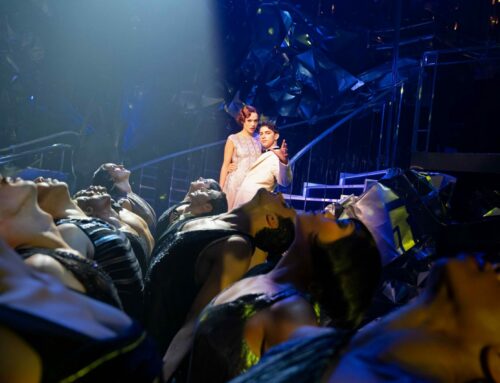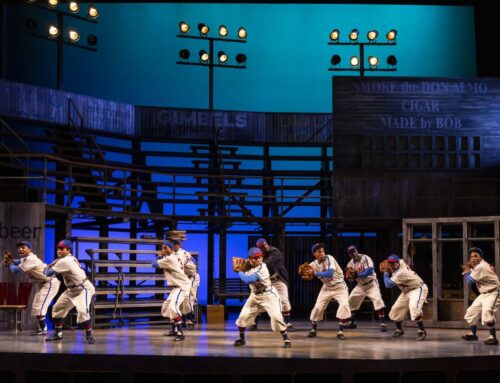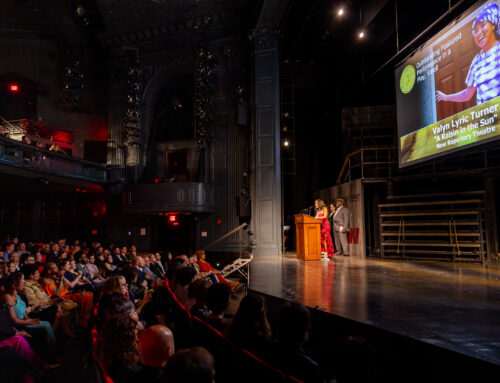Get right over to SPEAKEASY STAGE for a glimpse into a world you’ve probably never seen before. You may think you have, but you haven’t. Four-time Tony winner Harvey Fierstein has written his first play in 30 years. The Tony- nominated Best Play CASA VALENTINA is a real eye opener, hilarious, heart-wrenching, vibrantly directed by Scott Edmiston, and starring some of Boston’s finest actors.
CASA VALENTINA is based on an actual resort called the Casa Susanna in the Catskills of New York in the 1960’s. It was a place where heterosexual men would secretly go for the weekend and free their inner “girls.” They would dress as refined women in wigs and falsies, hose and high heels, dresses and make up. They would spend the entire weekend simply behaving as “normal” women, dancing, dining, doing “makeovers.”
CASA VALENTINA is set in 1962 and the resort is run by a married couple, Rita (Kerry A.Dowling) and her husband George (Thomas Derrah) who is “Valentina” when he dresses as a woman. Together, they welcome their regulars: Bessie–the wisecracking, Wilde-quoting Robert Saoud, Gloria–the svelte and gorgeous Eddie Shields, Terry–a gently prim Sean McGuirk, Amy– -a gun-toting judge turned be-ribboned matron played by a deeply affecting Timothy Crowe, and young Jonathan– a first timer who’s snuck away for the weekend while his wife is out of town. The ladies at the Casa transform him before our very eyes, into the fetching Miranda, delicate in pink, and so vulnerable as we watch her relax into her feminine self. It’s a huge step for her, emerging from the basement back home where she’s been dressing in secret, and out and into the light for the first time. Greg Maraio made my heart soar as I watched Miranda twirl in her petticoated full skirt.
Enter the daunting Charlotte–an arch Will McGarrahan who puts the molotov into the cocktails they have been so daintily swigging. Charlotte’s agenda is to organize the ladies into an official sorority in order to publicly legitimize their activities; that effort suddenly cracks the group open throwing them into chaos– political, sexual, social, marital. It seems that while all of these men are cross dressers on the surface, not all of their reasons for doing so are the same.
In fact, the play is based on real events uncovered by antique dealers who happened on a treasure trove of photographs of men dressed as women. But it was clear they were not drag queens. Not female impersonators. Not transexuals. But transvestites, heterosexual men who were dressed as women, who walked among us unseen, their stories largely unknown, and still not very well understood, even by the men themselves– whose most ardent wish was and is to completely pass as “normal” women.
Tension mounts in the play as the differences among the Casa’s clientele become apparent and the personal stake that each one these characters has in the outcome of events takes shape. But I was most interested not in the play’s plot revelations and external events, but rather in understanding yet another subculture of human society, and the labyrinth of worlds we inhabit unknowingly together. Fierstein has struck the right chord for these omni-sexual, gender-bending times, where sexuality seems to be taking every imagineable form, in every combination, on a deeply complex spectrum between male and female, sometimes either and sometimes simultaneously both. Why any one of these characters do what they do might involve everything from sexual arousal, to the simple asexual desire to express a feminine identity. Those reasons might be fluid and changing over a lifetime.
As the characters in the CASA VALENTINA collide around their reasons, relationships, and personal politics, we come to understand their isolation from each other, the inadequacy of labels, and the cruelty and senselessness of judging anyone’s proclivities, as well as the tragic consequences of not realizing that after all, we are each of us alone together. The play’s final, stunning moments make the point.
After a bruising conversation with his wife who has had to re-examine her place in their complicated union, George goes up to his room, removes the male garb in which he is “choking,” and begins to embrace himself, silently stretching under the light, slowly breathing life into the mysterious, radiant self that is Valentina. It is a moment of sheer joy that Thomas Derrah creates as George finds himself at home in the CASA VALENTINA.
See the New England premiere of CASA VALENTINA at SpeakEasy Stage in the BCA’s Calderwood Pavilion through November 28!







[…] https://joyceschoices.com/theater/theater-casa-valentina […]